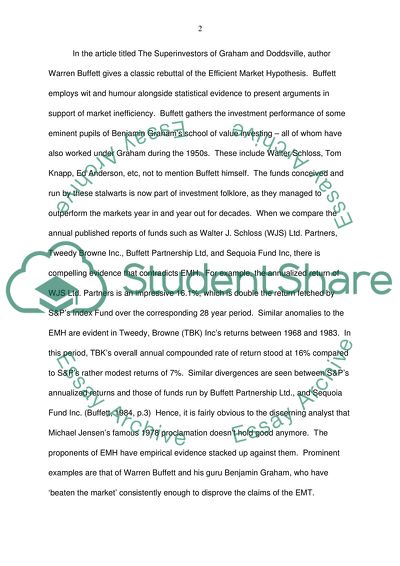Cite this document
(The Efficient Market Hypothesis Case Study Example | Topics and Well Written Essays - 2000 words, n.d.)
The Efficient Market Hypothesis Case Study Example | Topics and Well Written Essays - 2000 words. Retrieved from https://studentshare.org/marketing/1761458-when-the-price-of-a-stock-can-be-influenced-by-a-herd-on-wall-street-with-prices-set-at-the-margin-by-the-most-emotional-person-or-the-greediest-person-or-the-most-depressed-person-it-is-hard-to-argue-that-the-market-always-prices-rational
The Efficient Market Hypothesis Case Study Example | Topics and Well Written Essays - 2000 words. Retrieved from https://studentshare.org/marketing/1761458-when-the-price-of-a-stock-can-be-influenced-by-a-herd-on-wall-street-with-prices-set-at-the-margin-by-the-most-emotional-person-or-the-greediest-person-or-the-most-depressed-person-it-is-hard-to-argue-that-the-market-always-prices-rational
(The Efficient Market Hypothesis Case Study Example | Topics and Well Written Essays - 2000 Words)
The Efficient Market Hypothesis Case Study Example | Topics and Well Written Essays - 2000 Words. https://studentshare.org/marketing/1761458-when-the-price-of-a-stock-can-be-influenced-by-a-herd-on-wall-street-with-prices-set-at-the-margin-by-the-most-emotional-person-or-the-greediest-person-or-the-most-depressed-person-it-is-hard-to-argue-that-the-market-always-prices-rational.
The Efficient Market Hypothesis Case Study Example | Topics and Well Written Essays - 2000 Words. https://studentshare.org/marketing/1761458-when-the-price-of-a-stock-can-be-influenced-by-a-herd-on-wall-street-with-prices-set-at-the-margin-by-the-most-emotional-person-or-the-greediest-person-or-the-most-depressed-person-it-is-hard-to-argue-that-the-market-always-prices-rational.
“The Efficient Market Hypothesis Case Study Example | Topics and Well Written Essays - 2000 Words”. https://studentshare.org/marketing/1761458-when-the-price-of-a-stock-can-be-influenced-by-a-herd-on-wall-street-with-prices-set-at-the-margin-by-the-most-emotional-person-or-the-greediest-person-or-the-most-depressed-person-it-is-hard-to-argue-that-the-market-always-prices-rational.


